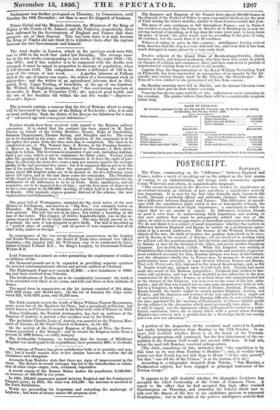POSTSCRIPT.
SATURDAY.
The Times, commenting on the " difference " between England and France, makes a merit of speaking out on the subject as the best means of coming to an understanding, and brings some accusations against Count Walewaki and others, in unmistakeable language. "The recent declaration in the Moniteur has, besides its significance as an overture towards an oblivion of past asperities, a significance scarcely leas important. It is now for the first time formally made known to the world, through a perfectly official and authentic channel, that there ex- ists a difference between England and France. This difference, in accord- ance with the conciliatory spirit which it has so honourably evinced, the Moniteur characterizes as of slight importance ; a conclusion in which we regret that we are unable to concur. In differences between friends no good is ever done by undervaluing their importance and seeking to slur over matters that must be peremptorily settled one way or the other, in order to secure an appearance of immediate peace and reconciliation. We do not think it is a subject of small importance whether the matters in difference between England and Russia be settled by a preliminary agree- ment or by a second conference. The honour of the Western Powers, the objects of the war, the faith of treaties, the position henceforth to be occu- pied by Russia in the councils of Europe—all are involved in settling what we will not call the questions raised, but the tricks and chicaneries attempted by Russia, at once by the decision of the Allies, and not by another European Congress. Let us look back a little. While the Emperor was seeking at Plombieres that relaxation which the incessant toils and anxieties of govern- ment rendered necessary for him, Russian intrigue was busy in his Cabinet. and the allegiance wholly due to France was, by means we do not care to particularize more precisely, at least divided between France and Russia. That wily Power saw, felt, and used to the utmost its advantage, and, as Sir W. Napier would say, jumped upon it with both feet. Prussia had never made any secret of her Russian sympathies ; Piedmont had yielded to flat- teries and eajoleries, and was at least doubtful in her adherence to the true construction of the treaty ; France, or at least those who misrepresented her in the absence of the Emperor, was won over to the cause of her late anta- gonist ; and all that was wanted was to raise some preposterous claim to sub- mit to a Congress, in which, by the votes of France, Sardinia, Prussia, and Russia herself, the matter might be carried against Fngland, Austria and Turkey, and the disgraces and reverses of the war cancelled by a single act of successful trickery If this Russian difficulty be not settled before the time appointed for the meeting of Parliament, we foresee infinite perils for the alliance in the discussion which must necessarily take place. How, it will be urged, can the diplomatic affairs of England be carried to a satis- factory conclusion, when she is closely allied with a power whose Foreign Minister has evinced such a predilection for a Sovereign lately our enemy and even now our adversary? "


























 Previous page
Previous page